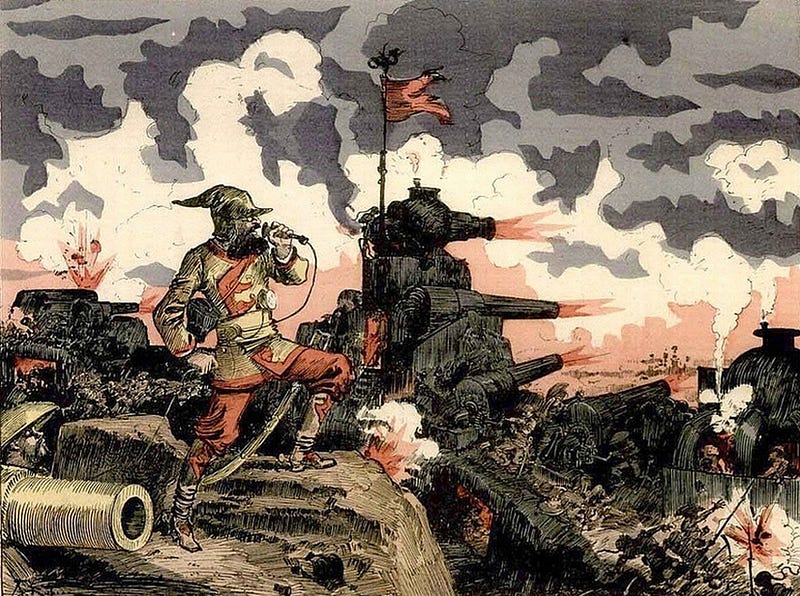# Futuristic Warfare and Ethics in Albert Robida's Vision
Written on
Chapter 1: Introduction to Robida's Futuristic Wars
Albert Robida’s science fiction narratives, particularly in La Vie Electrique, delve into the military implications of technological advancements, a theme he previously explored in his earlier novel, La Guerre au Vingtième Siècle ("War in the 20th Century"). His later work shifts focus toward the evolving ethics of warfare, contrasting with the earlier, more adventurous tone.
This article is part of a five-episode series examining Albert Robida's contributions to the genre. For a comprehensive understanding, reading the other articles is highly encouraged.
Robida does not explicitly predict the world wars; however, his narratives suggest that the 20th century is far from peaceful. While he refrains from detailing significant conflicts, it is evident that military forces continue to shape political dynamics, reminiscent of the 19th century. His portrayal of the French army in the 1950s mirrors the military of his time, depicting cavalry charges—now supplanted by motorized vehicles—coupled with artillery bombardments.
Section 1.1: The Evolution of Military Technology
Robida's vision includes motorized vehicles equipped with cannons and automatic weapons, showcasing an evolution from traditional warfare. He retains a nostalgic aesthetic, with images of gleaming helmets and large battalions clashing in close combat, although he often critiques this romanticized view. One notable illustration features "bicycletists," soldiers on velocipedes armed with lances, a nod to the late 19th-century practice of infantry cycling, originally used for intelligence and reconnaissance.
Nevertheless, he foresaw that future conflicts would involve cars and balloons, a prescient observation that materialized during World War I with the introduction of tanks, zeppelins, and airplanes. He recognized that while trench warfare and brutal encounters would persist, new technologies would facilitate more dynamic military strategies.
Subsection 1.1.1: The Transition to Mechanized Warfare

The concept of mechanized warfare was further echoed by H.G. Wells in his 1903 short story The Land Ironclads, which imagined heavily armored vehicles breaking through fortified trenches to support infantry. Lancelot Eldin De Mole's 1912 proposal for a tracked armored vehicle to safely transport soldiers over obstacles marked a significant development in military engineering, culminating in the first armored offensive in 1917.
Chapter 2: The Impersonality of Modern Warfare
Robida’s illustrations convey a sense of disillusionment with the impersonal nature of warfare, where mortar and cannon fire reduce soldiers to mere targets. He evokes nostalgia for the valor of close combat, contrasting it with the grim reality of modern conflict, where bravery is diminished to a desperate rush for survival amidst chaos.
The World of Steampunk - Episode 2 - This episode explores the implications of technological advancements in warfare, highlighting the ethical dilemmas faced by soldiers and commanders alike.
Section 2.1: A New Era of Warfare and Ethics
Robida hints at an emerging conflict between Danubia and Costa Rica, representing the often arbitrary nature of war driven by economic interests. In this narrative, arms dealers profit regardless of the conflicts they fuel, underscoring the ethical complexities surrounding warfare.
In a pivotal moment, Philox Lorris, a character in the story, discusses biological warfare, proposing to incapacitate enemies through pathogenic agents rather than lethal force. This shift indicates a trend towards a scientific approach in military strategy, integrating chemists into the armed forces and signaling a departure from traditional warfare ethics.
Section 2.2: The Role of Science in War
Robida's work critiques the intertwining of science and warfare, as Philox defends the notion that "perfecting war makes it humanitarian." The narrative reveals a growing power for medical professionals in warfare, as they transition from healers to participants in military strategy, raising profound questions about the ethics of such roles.
As the story unfolds, the characters grapple with the moral implications of their actions and the evolving nature of conflict. In the next episode, we will delve deeper into these themes. Stay tuned to your telephonoscope!